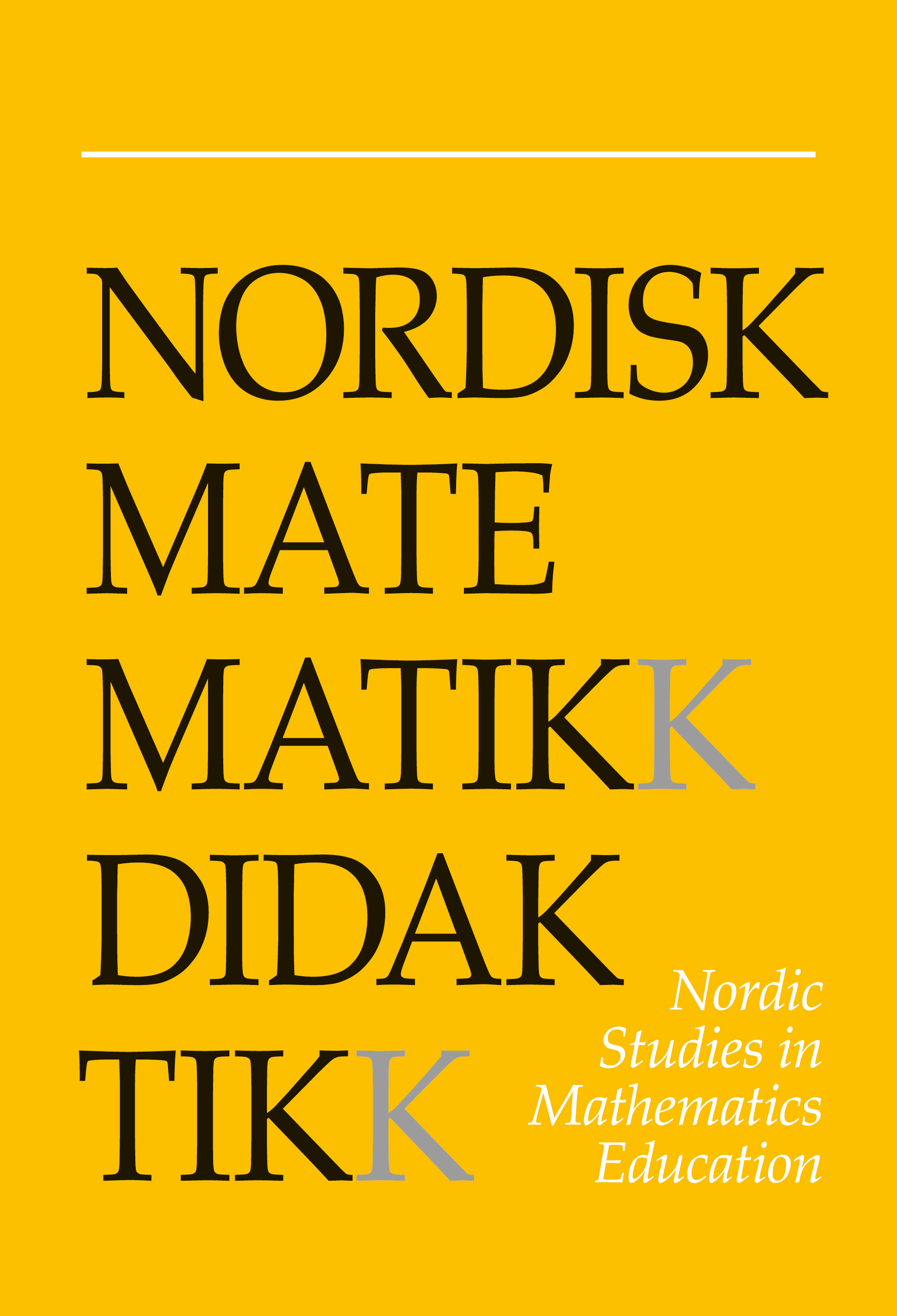Educational settings in relation to special educational needs in mathematics
DOI:
https://doi.org/10.7146/nomad.v25i3-4.149074Abstract
This paper focuses on students in need of special education in mathematics (SEM students) and highlights teachers’ and principals’ reflections upon these students’ construction of knowledge in relation to two educational settings: the regular teaching setting and the test setting. The findings indicate that SEM students’ knowledge is legitimized only when displayed. However, there appear to be differences according to the specific setting. Different settings imply different knowledge representations, norms, and practices that need to be taken into account when reflecting, planning, and carrying out teaching in mathematics in relation to SEM.
References
Alvunger, D. (2018). Teachers' curriculum agency in teaching a standards- based curriculum. The Curriculum Journal, 29 (4), 479-498. https://doi.org/10.1080/09585176.2018.1486721
Askew, M. (2015). Diversity, inclusion and equity in mathematics classrooms: from individual problems to collective possibility. In A. Bishop, H. Tan & T. N. Barkatsas (Eds.), Diversity in mathematics education: towards inclusive practices (pp. 129-145). Springer International. https://doi.org/10.1007/978-3-319-05978-5_8
Bagger, A. (2015). Prövningen av en skola för alla: nationella provet i matematik i det tredje skolåret (Ph.D. thesis). Umeå university.
Bagger, A. & Roos, H. (2015). How research conceptualises the student in need of special education in mathematics. In O. Helenius, A. Engström, T. Meaney, P.Nilsson, E. Norén, et al. (Eds.), Development of mathematics teaching: design, scale, effects. Proceedings of MADIF9 (pp. 27-36). SMDF.
Bendixen, L. D. & Feucht, F. C. (Eds.) (2010). Personal epistemology in the classroom: theory, research, and implications for practice. Cambridge University Press. https://doi.org/10.1017/CBO9780511691904
Bricker, L. A. & Bell, P. (2016). Exploring images of epistemic cognition across contexts and over time. In J. A. Greene, W. A. Sandoval & I. Bråten (Eds.), Handbook of epistemic cognition (pp. 197-214). Routledge.
Chinn, C. A., Buckland, L. A. & Samarapungavan, A. L. A. (2011). Expanding the dimensions of epistemic cognition: arguments from philosophy and psychology. Educational Psychologist, 46 (3), 141-167. https://doi.org/10.1080/00461520.2011.587722
Feucht, F. C. (2010). Epistemic climate in elementary classrooms. In L. D. Bendixen & F. C. Feucht (Eds.), Personal epistemology in the classroom: theory, research, and implications for practice (pp. 55-93). Cambridge University Press. https://doi.org/10.1017/CBO9780511691904.003
Feucht, F. C. & Bendixen, L. D. (2010). Exploring similarities and differences in personal epistemologies of U.S. and German elementary school teachers. Cognition and Instruction, 28 (1), 39-69. https://doi.org/10.1080/07370000903430558
Fives, H., Barnes, N., Buehl, M. M., Mascadri, J. & Ziegler, N. (2017). Teachers' epistemic cognition in classroom assessment. Educational Psychologist, 52 (4), 270-283. https://doi.org/10.1080/00461520.2017.1323218
Fives, H. & Gill, M. G. (Eds.) (2014). International handbook of research on teachers' beliefs. Routledge, Taylor & Francis. https://doi.org/10.4324/9780203108437
Greene, J. A., Sandoval, W. A. & Bråten, I. (2016). Handbook of epistemic cognition. Routledge. https://doi.org/10.4324/9781315795225
Hofer, B. K. & Pintrich, P. R. (1997). The development of epistemological theories: beliefs about knowledge and knowing and their relation to learning. Review of Educational Research, 67 (1), 88-140. https://doi.org/10.3102/00346543067001088
Hofer, B. (2000). Dimensionality and disciplinary differences in personal epistemology. Contemporary Educational Psychology, 25 (4), 378-405. https://doi.org/10.1006/ceps.1999.1026
Jordan, A., Schwartz, E. & McGhie-Richmond, D. (2009). Preparing teachers for inclusive classrooms. Teaching and Teacher Education, 25 (4), 535-542. https://doi.org/10.1016/j.tate.2009.02.010
Kiely, M. T., Brownell, M. T., Lauterbach, A. A. & Benedict, A. E. (2014). Teachers' beliefs about students with special needs and inclusion. In H. Fives & M. G. Gill (Eds.), International handbook of research on teachers' beliefs, 475-491. Routledge.
Maggioni, L. & Parkinson, M. M. (2008). The role of teacher epistemic cognition, epistemic beliefs, and calibration in instruction. Educational Psychology Review, 20 (4), 445-461. https://doi.org/10.1007/s10648-008-9081-8
Magne, O. (2006). Historical aspects on special education in mathematics. Nordic Studies in Mathematics Education, 11 (4), 7-35.
Muis, K. R., Trevors, G., Chevrier, M., Greene, J., Sandoval, W. & Bråten, I. (2016). Epistemic climate for epistemic change. In J. A. Greene, W. A. Sandoval & I. Bråten, I. (Eds.), Handbook of epistemic cognition, (pp. 331-359). Routledge.
Neuendorf, K. A. (2016). The content analysis guidebook. Sage. https://doi.org/10.4135/9781071802878
Roos, H. (2015). Inclusion in mathematics in primary school: What can it be? (Licentiate thesis). Linnaeus University.
Roos, H. (2019). The meaning of inclusion in student talk: inclusion as a topic when students talk about learning and teaching in mathematics (Ph.D. thesis). Linnaeus University.
Scherer, P., Beswick, K., DeBlois, L., Healey, L. & Moser Opitz. E. (2016). Assistance of students with mathematical learning difficulties: How can research support practice? ZDM, 48 (5), 633-649. https://doi.org/10.1007/s11858-016-0800-1
Schraw, G., Brownlee, J. L., Olafson, L. & Brye, M. V. V. (2017). Teachers' personal epistemologies: evolving models for informing practice. Information Age.
SFS 2008:567. Diskrimineringslag [Discrimination Act]. Ministry of Culture, Sweden.
Silverman, J. C. (2007). Epistemological beliefs and attitudes toward inclusion in pre-service teachers. Teacher Education and Special Education, 30 (1), 42-51. https://doi.org/10.1177/088840640703000105
Sinatra, G. M. (2016). Thoughts on knowledge about thinking about knowledge. In J. A. Greene, W. A., Sandoval & I. Bråten, I. (Eds.), Handbook of epistemic cognition (pp. 479-491). Routledge.
Solomon, Y. (2009). Mathematical literacy: developing identities of inclusion. Taylor and Francis.
Swedish National Agency (2018). Curriculum compulsory school, pre-school class, and school age educare (revised 2018). https://www.skolverket.se/publikationer?id=3984
Swedish Government (1990). Konventionen om barnets rättigheter [Convention on the rights of the child]. Ministry for Foreign Affairs.
Swedish Schools Inspectorate (2019). Rektors ledarskap. https://www.skolinspektionen.se/sv/Rad-och-vagledning/rektors-ledarskap/
Downloads
Published
How to Cite
Issue
Section
License

This work is licensed under a Creative Commons Attribution-NonCommercial-ShareAlike 4.0 International License.



